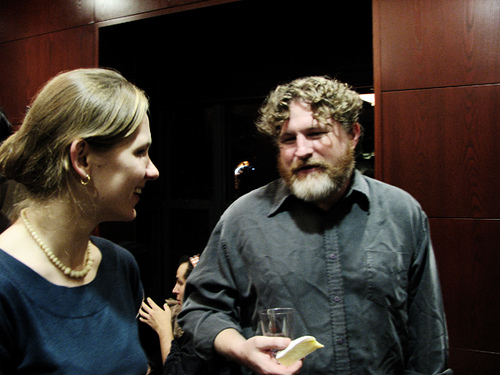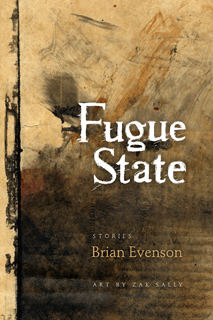Story by Story: Brian Evenson’s Fugue State (17) ‘Fugue State’

The 17th and titular story of Fugue State is also its lengthiest, and of all those before it, perhaps the tract with the widest aim. Whereas up until now the majority of the texts herein have reckoned with themselves via a manner of constant recursion, spiraling into their own centers, ‘Fugue State’ the story is bookended by situations that find the ever-disassociative protagonist at the cusp of exiting his interior–and yet, in each instance, the bookends ultimately also end up serving as mirrors, reflecting, again, the lack of light onto itself.
As the title suggests, and again as has been the primary defining factors of all of the voices herein, our protagonist suffers from the inability to keep his reality in crystal grips. Any time the sentences find him beginning to ascertain something about himself to be true, or presented as true to the reader, further sentences serve to skew that understanding via small strokes, often questions the protagonist asks himself–”Had he done anything wrong?” “But couldn’t he explain that away?” “’Is anybody there?’” “’Do you remember your name?’” The deeper on we tread into the story, also, the quicker the questions begin to come, as further skewing, and skewing of the skewing, leaves even the questions to be questioned. What is being asked?
October 21st, 2009 / 11:09 am
Story by Story: Brian Evenson’s Fugue State (14) ‘Helpful’

Fourteenth in the order of stories in Brian Evenson’s Fugue State (out now from Coffee House Press) is ‘Helpful,’ which originally appeared in Bombay Gin.
At this point in the collection, we have looped through loops of cold expanse and careful molding, each rendered in Evenson’s clean, calm and deadly sentences, most as blank as any stroke of light in a Kenneth Anger film, any globe of far off light.
Here, having crossed over the threshold of those gone rooms, and entered the center of the void via Evenson’s masterful arrangement of the stories so far, the frame of the lenses, like in Anger’s opus Invocation of My Demon Brother, begins to split.

July 30th, 2009 / 12:41 pm
Story by Story: Brian Evenson’s Fugue State (10) ‘Ninety Over Ninety’
 Tenth in the order of stories in Brian Evenson’s Fugue State (which is officially out TOMORROW from Coffee House Press) is ‘Ninety Over Ninety,’ which originally appeared in New York Tyrant.
Tenth in the order of stories in Brian Evenson’s Fugue State (which is officially out TOMORROW from Coffee House Press) is ‘Ninety Over Ninety,’ which originally appeared in New York Tyrant.
Among the several blackened modes of Brian Evenson, his comedy⎯heretofore only poked at from askance, and under another dark veil, in the earlier ‘Mudder Tongue’⎯is another sort of shrift, that where his other stories might take noir stylings, hallucination, and paranoia, another, like ‘Ninety Over Ninety,’ takes from the slapstick and the comedic-approaching-profane.
Certainly, in Evenson’s humor stories, the appeal is not only from his maintaining of a Kafka-ian eye in the face of strange ilk, but his simultaneously flagrant and pleasant-seeming attitude, in which foul things can be said and laughed at, perhaps like Todd Solodnz. It is interesting here too, at this point in the queue of stories, to find the meta-fucked black hole of the previous ‘In the Greenhouse,’ into this comedic blank so screwed it seems an intensified version of the current state of the frequent corporate ruin of art.
June 30th, 2009 / 1:05 pm
Sentence by Sentence & Story by Story (2): ‘A Pursuit’

The second story in Brian Evenson’s ‘Fugue State,’ is ‘A Pursuit,’ which I have written up in full here.
My sentence to keep from this story (I can’t say favorite anymore, as there are too many, but choices hereon will be considered strong and representative at once):
Would it help if I were to swear to you, by the deceased individual of your choice, that I had nothing to do with my first ex-wife’s demise, assuming she is in fact dead?
This sentence, itself a whole graph in the text, is wonderful again not only for its Evensonian use of odd familial tags such ‘first ex-wife’ (I always go back to his ‘The Ex Father,’ and those weird overtones of relationship bounds), but for how it manages to begin to drag the reader (the ‘you’) as an entity into the text, another relationship that will continue to be put to use in the extremely odd and Bernhard-ian summoning that goes on in this text.
As I discuss in the full story review, Evenson is a master of blurring the lines of his occurrences, here as delivered on behalf of the narrator, in such a way that it is not only hard to condemn or not condemn the actions of the central figure, it also blurs the body of that narrator with the body of the reader, in such a way that the reading itself becomes an experience. You are caught in the narrator’s ongoing waddle into his own mind. You follow him along terrain that will not hold, etc.
The question is a question that eats the space out from between the reader and the narrator itself, which, how much more could you ask from a single line?
Sentence by Sentence & Story by Story: Brian Evenson’s ‘Fugue State’
 Just got a galley of Brian Evenson’s new collection ‘Fugue State,’ coming out in July from Coffee House Press. I haven’t felt this giddy about a book in a while. As with each Evenson title that comes out, I feel he reroutes not only the terrain of what is possible in fiction, but my own mind and method of writing: the power of new blood page by page.
Just got a galley of Brian Evenson’s new collection ‘Fugue State,’ coming out in July from Coffee House Press. I haven’t felt this giddy about a book in a while. As with each Evenson title that comes out, I feel he reroutes not only the terrain of what is possible in fiction, but my own mind and method of writing: the power of new blood page by page.
In the spirit of this, and because I’m so excited about it I can’t help not, I’ll be exploring the book and reviewing it or commenting on it story by story, between longer posts on my own blog, and over here, at Giant, sharing my favorite sentence from each story, beginning now, with the first piece in the collection, ‘Younger,’ which kicked off the book in massive, terrored form, if in a more subtle and understated way than Evenson’s past might have predicted, maybe even more so, for it, terrifying.
In this way, we’ll lead up to the release of the book in July slowly and then continue with posts thereafter with the book in people’s hands.
Here’s the sentence:
They weren’t getting anywhere, which meant that she, the younger sister, wasn’t getting anywhere, was still wondering what, if anything, had happened, and what, if anything, she could do to free herself from it.
I love the repetition in the short segments here, the repeating and recursing tonalities, but also the mental loop of the logic therein, the sentence trying to figure what it is saying out while it is saying which as a pocket in the story, about being locked in a moment of a life, hit full on in its pacing, with the kind of abstract but right-there verbiage and at-your-throat but aimed away construction that seems so difficult to nail, and yet which Evenson is unarguably a master.
My full post on the story itself is now live here.
More info on ‘Fugue State’ here.
Preorder ‘Fugue State’ here.
More all in thereon to be continued…

